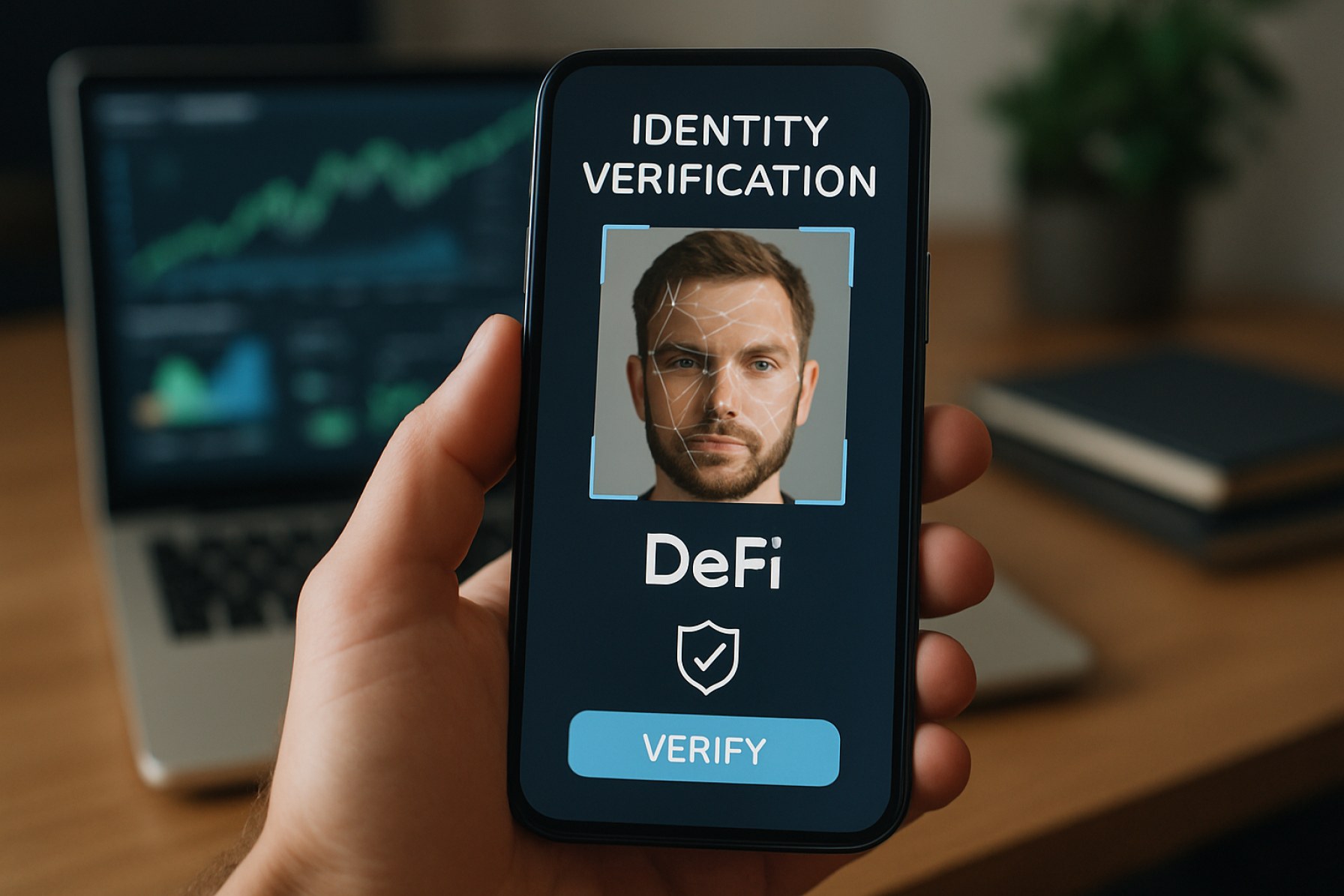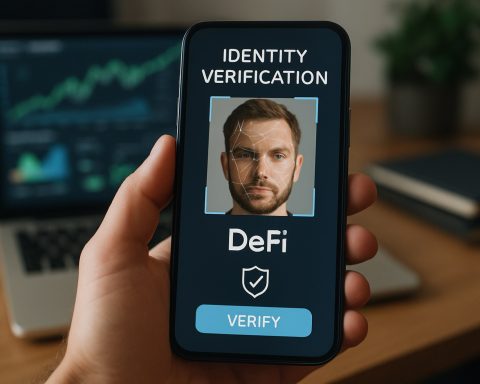Identity Verification in Decentralized Finance 2025: Navigating Compliance, Innovation, and Market Expansion. This report delivers in-depth analysis of key trends, growth forecasts, and the evolving technology landscape shaping DeFi identity solutions.
- Executive Summary & Market Overview
- Key Technology Trends in DeFi Identity Verification
- Competitive Landscape and Leading Solution Providers
- Market Growth Forecasts 2025–2030: CAGR, Revenue, and Adoption Rates
- Regional Analysis: Adoption Patterns and Regulatory Drivers
- Challenges and Opportunities: Compliance, Privacy, and User Experience
- Future Outlook: Emerging Use Cases and Strategic Recommendations
- Sources & References
Executive Summary & Market Overview
The rapid expansion of Decentralized Finance (DeFi) has transformed the financial landscape by enabling peer-to-peer transactions and financial services without traditional intermediaries. However, this innovation has also introduced significant challenges regarding identity verification, regulatory compliance, and security. Identity verification in DeFi refers to the processes and technologies used to authenticate users’ identities while preserving the core principles of decentralization and privacy. As of 2025, the market for identity verification solutions tailored to DeFi is experiencing robust growth, driven by increasing regulatory scrutiny, the rise in illicit activities, and the need for secure, user-friendly onboarding processes.
According to Chainalysis, illicit activity in DeFi protocols accounted for over $2.8 billion in 2023, prompting regulators worldwide to demand stricter Know Your Customer (KYC) and Anti-Money Laundering (AML) measures. This has accelerated the adoption of decentralized identity (DID) frameworks and zero-knowledge proof (ZKP) technologies, which allow users to prove their identity or credentials without revealing sensitive personal information. Leading DeFi platforms are increasingly integrating these solutions to balance compliance with user privacy.
The global digital identity verification market, which includes DeFi-specific solutions, was valued at approximately $10.5 billion in 2023 and is projected to reach $18.6 billion by 2027, growing at a CAGR of 15.2%, according to MarketsandMarkets. Within this, the DeFi segment is emerging as a key growth driver, with startups and established players such as SpruceID, Civic, and Sphereon developing innovative identity solutions tailored for decentralized ecosystems.
The market is also witnessing increased collaboration between DeFi protocols and regulatory bodies. The Financial Action Task Force (FATF) has issued updated guidelines urging DeFi platforms to implement effective identity verification mechanisms. In response, industry consortia and alliances are working to establish interoperable standards for decentralized identity, aiming to streamline compliance while maintaining the open, permissionless nature of DeFi.
In summary, identity verification in DeFi is at a pivotal juncture in 2025, shaped by regulatory developments, technological innovation, and the imperative to secure decentralized financial systems. The sector is poised for continued growth as stakeholders seek solutions that reconcile compliance, privacy, and user experience.
Key Technology Trends in DeFi Identity Verification
Identity verification in decentralized finance (DeFi) is rapidly evolving, driven by the need to balance regulatory compliance with the sector’s foundational principles of privacy and decentralization. In 2025, several key technology trends are shaping how DeFi platforms approach identity verification, aiming to enhance security, user experience, and regulatory alignment without compromising user autonomy.
- Decentralized Identifiers (DIDs) and Verifiable Credentials: The adoption of decentralized identifiers (DIDs) and verifiable credentials is accelerating. These technologies allow users to control their identity data and selectively disclose information to DeFi platforms. Projects like Evernym and SpruceID are pioneering DID frameworks, enabling seamless, privacy-preserving onboarding and compliance processes.
- Zero-Knowledge Proofs (ZKPs): Zero-knowledge proofs are gaining traction as a method for users to prove aspects of their identity (such as age or residency) without revealing underlying personal data. This cryptographic approach is being integrated into DeFi protocols to facilitate regulatory compliance (e.g., KYC/AML) while maintaining user privacy. Companies like zkProof and iden3 are at the forefront of ZKP development for identity verification.
- On-chain Reputation Systems: DeFi platforms are increasingly leveraging on-chain reputation systems, where users build verifiable histories based on their interactions and behaviors. These systems, such as those developed by Civic and Lens Protocol, enable risk assessment and trust-building without traditional identity checks, supporting pseudonymous participation while deterring malicious actors.
- Interoperable Identity Standards: The push for interoperability is leading to the emergence of cross-chain identity standards. Initiatives like Hyperledger Indy and W3C DID Core are facilitating the use of a single digital identity across multiple DeFi platforms and blockchains, reducing friction and enhancing user control.
- Regulatory Technology (RegTech) Integration: DeFi projects are integrating RegTech solutions to automate compliance with evolving global regulations. Providers such as Chainalysis and TRM Labs offer tools for real-time transaction monitoring and identity screening, helping DeFi platforms meet KYC/AML requirements without centralized data storage.
These trends reflect a broader industry shift toward privacy-preserving, user-centric identity solutions that align with both regulatory demands and the decentralized ethos of DeFi. As these technologies mature, they are expected to become foundational to the next generation of DeFi platforms in 2025 and beyond.
Competitive Landscape and Leading Solution Providers
The competitive landscape for identity verification in decentralized finance (DeFi) is rapidly evolving as regulatory scrutiny intensifies and the need for robust Know Your Customer (KYC) and Anti-Money Laundering (AML) solutions grows. Unlike traditional finance, DeFi platforms operate without centralized intermediaries, making identity verification both a technical and regulatory challenge. In 2025, the market is characterized by a mix of established digital identity providers, blockchain-native startups, and collaborative consortia aiming to balance compliance with user privacy.
Leading solution providers are leveraging a combination of on-chain and off-chain technologies to deliver secure, privacy-preserving identity verification. Jumio and Onfido, both established in the broader digital identity space, have expanded their offerings to support DeFi protocols, integrating AI-driven document verification and biometric authentication with blockchain interoperability. These companies are often chosen by DeFi platforms seeking to meet global regulatory requirements without compromising user experience.
Blockchain-native providers such as Civic and Spruce are at the forefront of decentralized identity (DID) solutions. Civic’s platform enables users to control their identity credentials via non-custodial wallets, allowing for reusable KYC across multiple DeFi applications. Spruce, meanwhile, focuses on verifiable credentials and decentralized identifiers, supporting projects like Sign-In with Ethereum, which allows users to authenticate without revealing unnecessary personal data.
Consortia and industry alliances are also shaping the competitive landscape. The Trust Over IP Foundation and Decentralized Identity Foundation are fostering interoperability standards and best practices, enabling cross-platform identity verification and reducing vendor lock-in for DeFi projects.
- Market Trends: There is a clear trend toward zero-knowledge proof (ZKP) technologies, allowing users to prove eligibility (e.g., age, jurisdiction) without disclosing full identity, as seen in solutions from zkProof and Iden3.
- Strategic Partnerships: Leading DeFi protocols are increasingly partnering with identity providers to offer optional or tiered KYC, balancing regulatory compliance with the ethos of decentralization.
- Regional Dynamics: Providers are tailoring solutions to meet the specific regulatory requirements of jurisdictions such as the EU’s MiCA and the U.S. FinCEN guidance, driving demand for flexible, modular identity verification frameworks.
As DeFi matures, the competitive landscape will likely consolidate around providers that can deliver seamless, privacy-centric, and regulation-ready identity verification, positioning themselves as critical infrastructure for the next generation of decentralized financial services.
Market Growth Forecasts 2025–2030: CAGR, Revenue, and Adoption Rates
The identity verification market within decentralized finance (DeFi) is poised for robust expansion between 2025 and 2030, driven by increasing regulatory scrutiny, the proliferation of DeFi platforms, and the growing need for secure, compliant user onboarding. According to projections by MarketsandMarkets, the global identity verification market is expected to reach $18.6 billion by 2027, with a compound annual growth rate (CAGR) of 14.4%. While this figure encompasses the broader identity verification sector, DeFi-specific adoption is anticipated to outpace the general market due to the sector’s unique compliance and security challenges.
Industry analysts from Juniper Research forecast that by 2030, over 60% of DeFi platforms will have integrated advanced identity verification solutions, up from less than 20% in 2024. This surge is attributed to the implementation of global anti-money laundering (AML) and know-your-customer (KYC) regulations, which are increasingly being extended to decentralized protocols. The adoption rate is expected to accelerate particularly in regions with proactive regulatory frameworks, such as the European Union and parts of Asia-Pacific.
Revenue generated from identity verification services in DeFi is projected to grow at a CAGR exceeding 18% from 2025 to 2030, outpacing the overall DeFi market growth rate. Gartner estimates that blockchain-related spending, including identity solutions, will surpass $19 billion by 2024, with a significant portion allocated to compliance and security infrastructure in DeFi. As decentralized identity (DID) frameworks and zero-knowledge proof (ZKP) technologies mature, their adoption is expected to further drive market growth, enabling privacy-preserving yet compliant verification processes.
Key market players such as Onfido, Jumio, and Socure are actively developing DeFi-specific solutions, and partnerships between DeFi protocols and identity verification providers are expected to multiply. By 2030, the market is likely to see a consolidation of providers offering interoperable, blockchain-native identity verification services, supporting both regulatory compliance and user privacy.
Regional Analysis: Adoption Patterns and Regulatory Drivers
The adoption of identity verification solutions in decentralized finance (DeFi) is exhibiting marked regional variation in 2025, shaped by regulatory frameworks, technological readiness, and market maturity. In North America, particularly the United States and Canada, regulatory scrutiny has intensified following high-profile DeFi-related frauds and money laundering cases. The U.S. Securities and Exchange Commission (U.S. Securities and Exchange Commission) and the Financial Crimes Enforcement Network (FinCEN) have issued guidance mandating Know Your Customer (KYC) and Anti-Money Laundering (AML) compliance for DeFi platforms that facilitate fiat on- and off-ramps. This has driven rapid adoption of advanced identity verification tools, including biometric authentication and decentralized identifiers (DIDs), among U.S.-based DeFi projects.
In the European Union, the Markets in Crypto-Assets Regulation (MiCA), set to be fully enforced by 2025, is a major regulatory driver. MiCA requires DeFi platforms to implement robust KYC/AML procedures, pushing the region toward widespread integration of digital identity solutions. The European Blockchain Services Infrastructure (European Blockchain Services Infrastructure) is also fostering cross-border interoperability of digital identities, further accelerating adoption. As a result, European DeFi projects are increasingly partnering with RegTech firms to ensure compliance and seamless user onboarding.
Asia-Pacific presents a more fragmented landscape. Singapore and Hong Kong have emerged as regional leaders, with proactive regulatory sandboxes and clear guidelines from the Monetary Authority of Singapore (Monetary Authority of Singapore) and the Hong Kong Monetary Authority (Hong Kong Monetary Authority). These jurisdictions are seeing strong uptake of privacy-preserving identity verification protocols, balancing compliance with user anonymity. Conversely, in countries like India and China, regulatory uncertainty and restrictions on crypto activities have dampened DeFi growth and, by extension, the adoption of identity verification solutions.
In Latin America and Africa, DeFi adoption is driven by financial inclusion needs, but regulatory frameworks remain nascent. Countries such as Brazil and Nigeria are exploring digital identity pilots, but the lack of standardized regulations has led to a patchwork of approaches. This creates both opportunities and challenges for identity verification providers, who must tailor solutions to diverse legal and technological environments.
Overall, the regional adoption of identity verification in DeFi is closely tied to the pace and clarity of regulatory developments. Jurisdictions with clear, enforceable guidelines are seeing the fastest and most sophisticated integration of identity solutions, while regions with regulatory ambiguity lag behind.
Challenges and Opportunities: Compliance, Privacy, and User Experience
The rapid expansion of decentralized finance (DeFi) has brought identity verification to the forefront, presenting a complex interplay of challenges and opportunities in compliance, privacy, and user experience. As DeFi platforms increasingly intersect with regulatory frameworks, the need for robust identity verification mechanisms is intensifying.
Compliance Challenges: DeFi’s core principle of permissionless access often conflicts with global regulatory requirements, such as anti-money laundering (AML) and know-your-customer (KYC) mandates. Regulators in the US, EU, and Asia are intensifying scrutiny, with the Financial Action Task Force (FATF) and FINRA emphasizing the need for DeFi protocols to implement effective identity checks. However, the decentralized nature of these platforms makes it difficult to assign responsibility for compliance, leading to regulatory uncertainty and potential enforcement actions.
Privacy Considerations: DeFi users are highly sensitive to privacy, often attracted by the promise of pseudonymity. Traditional KYC processes, which require the collection and storage of personal data, are at odds with these expectations. Emerging solutions, such as zero-knowledge proofs and decentralized identifiers (DIDs), offer a way forward by enabling users to prove their identity or eligibility without revealing sensitive information. Projects like zkProof and Evernym are pioneering these privacy-preserving technologies, but widespread adoption remains in its early stages.
- Opportunities for Innovation: The demand for seamless, privacy-centric identity verification is spurring innovation. Startups and established players are developing on-chain KYC solutions, reusable digital identities, and composable compliance modules. For example, Chainalysis and TRM Labs are integrating advanced analytics to help DeFi platforms monitor transactions and flag suspicious activity without compromising user experience.
- User Experience: Balancing compliance and privacy with a frictionless user journey is a key differentiator. Solutions that minimize onboarding steps and leverage wallet-based authentication are gaining traction. According to McKinsey & Company, platforms that streamline identity verification can reduce abandonment rates and foster greater trust among users.
In 2025, the convergence of regulatory pressure, privacy innovation, and user-centric design will shape the future of identity verification in DeFi. Platforms that successfully navigate these challenges stand to capture significant market share as institutional and retail adoption accelerates.
Future Outlook: Emerging Use Cases and Strategic Recommendations
Looking ahead to 2025, the landscape of identity verification in decentralized finance (DeFi) is poised for significant transformation, driven by both regulatory pressures and technological innovation. As DeFi platforms continue to attract mainstream users and institutional capital, the demand for robust, privacy-preserving, and interoperable identity solutions is intensifying.
Emerging use cases are centered around the integration of decentralized identity (DID) frameworks, which enable users to control and selectively disclose their credentials without relying on centralized authorities. Projects leveraging verifiable credentials and zero-knowledge proofs are gaining traction, allowing DeFi protocols to comply with Know Your Customer (KYC) and Anti-Money Laundering (AML) requirements while maintaining user privacy. For example, solutions like Polygon ID and zkPass are being piloted to facilitate seamless, on-chain identity verification without exposing sensitive data, a trend expected to accelerate as regulatory scrutiny increases in 2025 (Polygon Technology).
Another emerging use case is the development of cross-chain identity standards, which aim to enable users to carry their verified credentials across multiple DeFi ecosystems. This interoperability is critical as DeFi becomes increasingly multi-chain, and it is being addressed by initiatives such as the Decentralized Identity Foundation’s Universal Resolver and the W3C’s Verifiable Credentials standard (Decentralized Identity Foundation; World Wide Web Consortium).
Strategically, DeFi platforms are advised to:
- Adopt modular identity verification solutions that can be updated as regulatory requirements evolve, ensuring long-term compliance and flexibility.
- Prioritize user experience by integrating privacy-preserving technologies that minimize friction during onboarding and transactions.
- Collaborate with industry consortia and standards bodies to ensure interoperability and avoid vendor lock-in.
- Monitor regulatory developments closely, particularly in the EU and US, where new frameworks for digital identity and crypto-asset regulation are expected to shape market requirements (European Parliament; U.S. Securities and Exchange Commission).
In summary, the future of identity verification in DeFi will be defined by the convergence of privacy, compliance, and interoperability. Platforms that proactively invest in next-generation identity solutions and align with emerging standards will be best positioned to capture growth and mitigate regulatory risks in 2025 and beyond.
Sources & References
- Chainalysis
- MarketsandMarkets
- SpruceID
- Civic
- Sphereon
- Evernym
- zkProof
- iden3
- Lens Protocol
- Hyperledger Indy
- W3C DID Core
- TRM Labs
- Trust Over IP Foundation
- Juniper Research
- Socure
- FinCEN
- European Blockchain Services Infrastructure
- Monetary Authority of Singapore
- Hong Kong Monetary Authority
- FINRA
- McKinsey & Company
- Polygon Technology
- Decentralized Identity Foundation
- European Parliament








